SC born, New York based actor and writer. I'm an actor. I weigh in on acting/industry issues. And music. And whatever I want. www.stevenmoskos.com
Don't wanna be here? Send us removal request.
Text
Are War Movies Inherently Pro-War?
I don’t actually know the answer to this question.
I don’t want to bury the lied, so I’ll come right out and say that this is about Patton. Recently recording the Should We Keep This episode on Patton, Gina made the argument that Patton’s ambition and ruthlessness are simultaneously glorified and condemned. The viewer who loves violence with see violence condoned; the pacifist, condemned.
I disagree. I think the film is prowar. I think it glorifies a fascist who said he would rather have fought with the Nazi’s against the Russians.
The film--to me--is also a pretty blatant piece of Pro-Vietnam propaganda. I’ve dropped the flag speech below (a portion of it). Judge for yourself, but I can’t isolate that rhetoric as movie dialogue. It is about Vietnam.
youtube
French Filmmaker Francois Truffaut makes the interesting argument that by portraying the thrill of combat, the action of it, combat is inherently glorified.

I agree with Truffaut, and I’ve thought a good bit about what an anti-war film could actually be. To me, there would have to be a numbness, an anonymity to soldiers. Something that expresses that, to the people waging the war (politicians), individual soldiers are not individuals. And battle isn’t entertaining. It’s mostly waiting. Waiting to go out. Waiting to pack up. Waiting for anything to happen.
Somehow, the greatest piece of antiwar art has to be the Green Table, the 1967 work by the Joffrey Ballet. It really captures the disconnect between the people sending soldiers to fight, and the soldiers who do the fighting. I’ve dropped the first half below. It’s hard to find the full length version in good quality.
youtube
I wish the post were more succinct. I also wish it were better structured. But it’s not. Do you think an antiwar film is possible? How would you make it?
#war#vietnam#patton#steven#should we keep this#acting#podcast#joffrey ballet#green table#francois truffaut
1 note
·
View note
Text
1969 The Death of the American Cowboy
What the hell was going on in 1969?
The top grossing film of 1969 was Butch Cassidy and the Sundance Kid.

The Best Picture winner (and second highest grossing) was Midnight Cowboy.

Both films are (obviously) centering around cowboys. One would be inclined to point out the difference in the kind of cowboy, or claim that Midnight Cowboy is using the term more ironically. True? Yes. But in terms of why, in terms of what it’s doing with that irony, the two movies have far more in common than they may seem.
1. The decline of the Rugged Individual
In Midnight Cowboy, Joe Buck is portrayed as an ultra naïve, modern cowboy who doesn’t fit into urban New York. As he attempts to assert himself, he is broken down to the point of personal and financial ruin.

In Butch Cassidy and the Sundance Kid, authorities are literally attempting to kill the two heroes who are the
2. Sex work
No particular commentary is made on sex work, but it is highly prevalent in both films which implies there was a permissiveness toward their depiction that at least I did not expect.

Also, yes, a movie may go against cultural norms, but no movie is made without the expectation (or hope) that people will want to see it. As the microcosm reflects the macrocosm (I AM PRETENTIOUS!!), one would think that the presence sex work implies that people thought mainstream America would want to see it. And they did! Butch Cassidy made $100mil, and Midnight Cowboy made $40mil.
3. Modernity will destroy your spirit

Perhaps this is personal bias, but I see New York City as an inherent symbol of modernity, so a South Western guy unable to make it New York is inherently a man at odds with most modern parts of culture, and he is destroyed.
In Butch Cassidy, they rely on their wits and usual tricks, until they come in contact with a new group of identity-less trackers that systematically, persistently, and unshakably hunt them down. They are, in a way, encountering a kind of technology for the first time, and it will kill them—and they’re the best, so it will kill anyone below them.
4. Safety and Peace come at the ability to matriculate into a community. Butch and Sundance finally realize they have to “go straight,” and get normal jobs. That’s the only way to get out with their lives. This plan gets turned on its head, they’re unable to join the community, and they are killed.
Joe Buck attempts to assert his identity (heavily symbolized through his clothes) as a rugged Texan and (to say it again) is destroyed. When he leaves New York and goes to Florida, the first thing he does is throw his old clothes away and buy clothes that fit in with the culture of Florida. He wants to get a normal job that will allow him to just fit in. Value comes at being accepted into the group, not in being yourself.

When I think of 1969, I think of the end of Flower Power, the transition into the 70s—the release of Abbey Road as well as Led Zeppelin I. I know that America is headed for a period of urban decline and crisis. I don’t think of struggle between a frontiersman ideology and modern, postindustrial one. I look forward to learning more about the role this struggled played in creating the 70s and beyond, as well as looking more into the way a contemporary culture is aware of its own change.
8 notes
·
View notes
Text
Let’s remake that! QUO VADIS
You’re first question: What is Quo Vadis? Here’s the trailer.
youtube
Quo Vadis is the top grossing film of 1951. It’s an historical epic taking place during the reign of Nero. The story is from the apocryphal Acts of Peter. A roman centurian falls in love with a hostage being held by a friend of his. What he doesn’t realize is that both the woman and his friend are Chrisitians (oooooo!). The film covers both his attempt to woo her, Nero’s burning of Rome, and the Centurian’s eventual conversion. Nero feeds the Christians to the lions, but, when Lygia (the love interest) is sent into the arena, Marcus Vinicius (the hero) jumps in, saves her, and they escape.
Somehow this movie was both the top grossing film of 1951, and was the movie that saved MGM (clearly movies were in a lull, because Cinderella, the previous year, saved the film production wing of Disney). It is a bad movie. Acting was shit. They were VERY proud of the fact that they used 30,000 extras, because that is important for a film.
What about this movie is shit?
1. There’s a prologue. Like a five minute long one.

A long ass voice over about being in the time of Nero that is ludicrously unnecessary. It’s just a vehicle to show how many Italians they employed—because Italy was impoverished after World War II, so these actors should be viewed as exploited labor, and the leveraged cost-effectiveness is Italy profiting off of their history of Fascism. So we get rid of that. 2. Confused ass messaging. So this movie is about Romans, but the hero is definitely evoking the likes of a Western. He struts. His speech patterns are John Wayne-esque. And what happens in that genre? The love interest is desperate for him. She may oppose, but she will fall. But this woman is a Christian. So her falling, is her rejecting her Christian values. This is in 1951. If Christian woman is overly affectionate toward a Christian man, that was a scandal. If that man was an outspoken atheist? Get of out here. A pagan?! I’m in stiches. This movie’s juggling of a genres left it starkly opposing contemporary norms/mores. And yet, it was the most popular film… so I can’t imagine what was in the mind of the audience. My assumption: they were totally uncritical of what they were watching and it’s mixed messages.

3. Misogyny is through the roof. I’ll just leave quotes.
a. “A woman has no past when she mates with a God.” b. A friend of the hero says he misses his family, and wants to have his child on his knee. The hero responds: “That little slave girl Petronius told me about: I’ll make her sit on mine.” c. Trying to get the woman to talk, he offers her wine: “the panacea for all reticence.” d. After meeting with Paul, the hero tells his love interest: “That beggar-faced philosopher shouldn’t be stuffing your luscious little head with such nonsense.”
4. Animal Rights: There are dozens of animals incorporated in the film: horses, leopards, lions, a bull. I do not trust that there were not significant animal rights abuses, especially since there is a scene where a man fights and--through the power of God--breaks the neck of a bull.

So why do I want to remake it?
This is a story about a marginalized group being scapegoated by a corrupt leader. In the 1950s, it wasn’t particularly effective because the team wasn’t pressing the point of having the audience see themselves in the oppressor or the oppressed. But, Romans being the oppressors puts white audiences in the role of the oppressor, but having Christians also puts them in a position to side with the oppressed. How timely is that? Nero scapegoating Christians is easily extended/paralled to the scapegoating of Muslims and Mexicans by our current administration.Truth will out. Corruption cannot absolve itself by gambling for resurrection.
Also, there were many empowered women. Poppia, Nero’s wife was very strong. Lygia—despite having an arc bent to satisfy the tropes of the genre—has some good lines. One quote that was particularly awesome? The hero is telling her that he’ll buy her if she won’t submit to him (romantic AF right?) She retorts: “What false security you must have in your heart, and soul, and your manhood.” Damn! That’s some good shit.
I really do feel like a cool movie could be made if any level of consciousness was put into the depiction of gender roles, or abusive power, or the tyranny of an easily led mob. It could be really cool, and timely, and powerful, and actually mean something, instead of being a film that somehow manages to reinforce the status quo despite all the pieces it puts in place.
Fuck this movie.
But also, let’s do it again.
#quo vadis#old hollywood#movie review#acting#Steven Moskos#Should We Keep This#robert taylor#deborah kerr
2 notes
·
View notes
Text
Cinderella is a crazy ass movie!
So…. For reasons that will become clear in a month, I recently rewatched the film Cinderella. If you have not seen this film lately, WATCH IT! –except you can’t watch it, because the Disney vault is the most outdated supply/demand control system. (But secretly, it is on youtube in many parts).
This movie is insane!
Why you ask?
1. This is movie is 74 minutes long. Very short, even for that time. The fifties was kind of the age of 3 hour historical epics. And, out of this 74 minutes, at least 30 minutes are devoted to the side plot of the mice running from Lucifer, cat.
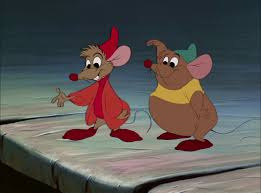
Almost 50% of the film that created the Cinderella craze (yes, the original is much older, but this film clearly gets the ball rolling), is not about Cinderella. 2. Cinderella makes NO choices. I correct myself. She makes one choice. What happens to Cinderella: she’s born rich, her father remarries, her father dies, step family forces her into servitude. When there’s going to be a ball, she wants to go, but she doesn’t CHOOSE to go. She has to, by royal decree. She wants to make a nice dress, but SHE DOESN’T. The mice do it. And they gather the flourishings that get add to the dress. Then, she can’t go, because her sisters ruin her clothes. Her fairy godmother appears, fixes her up, “But I can’t go to the—” “Shut your mouth.”
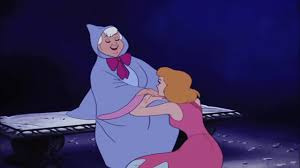
She makes Cinderella go. Looking for the prince, he finds her and starts to dance with her. Then, she has to leave because of the time. Then she gets locked in the attic. She doesn’t try to escape; she gets broken out by the mice. Then, she goes down stairs to try the shoe on (another royal decree), and the slipper breaks because the step mother is absolute evil. Then, we get Cinderella’s ONE choice: she chose to bring the second shoe down with her. She puts it on, and Happily Ever After. a. Side note: There was a writer, Maurice Rapf, that wanted the spell to last until midnight, and then Cinderella would have to choose: return to her oppressive home life, or escape it, putting the responsibility on Cinderella to get out. Seems interesting. He was fired. 3. Tiny Ass Foot! Her shoe is so small that it fits in the grand duke’s palm. It is less than half the size of her step sisters’ shoes. However, Cinderella’s shoes aren’t just incomprehensibly small. They’re actually too big, because, three times in the movie, her shoe falls off her foot. And always her left foot. Up or down stairs, that left shoe is coming off. 4. Fever dream! So, I guess it’s hard to get behind the mind of movie goer in 1950—what were they seeing/liking because it had never been done before? Marvel movies have lots of extraneous effects that are there to just be like, “Look what we can do!” but don’t actually contribute to anything. Thus, the Dream Sweet Nightingale song was born. She’s washing the floor, being effortlessly good at singing, and then the bubbles float up and she’s in the bubbles and she’s harmonizing with herself, and you’re watching like: this written by someone on hallucinogenics, right? Nope. Just animators being like: Check out these bubbles we can draw.
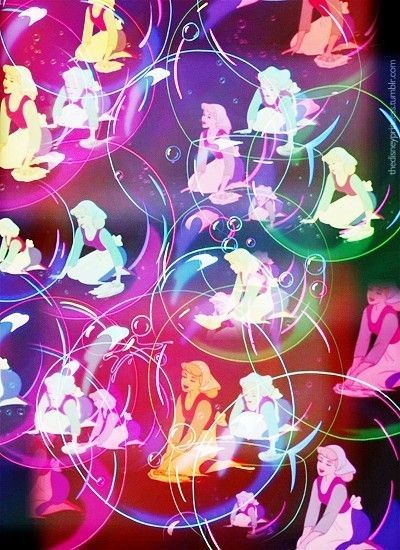
And clearly, audiences were like: “damn, are those bubbles?” 5. Magic doesn’t exist before the godmother. In any film that incorporates magic, I need to know right off the bat: what kind of magic? Who has the powers? What gives people powers? When should I expect to see/not see the powers? This is stuff to clear up in Act One. Harry Potters bangs it out in chapter one. And it keeps insinuating he’s magical up until told: “You’re a wizard.” NOTHING in this movie is magical (except that she talks to animals—which, maybe, was supposed to clue us in, but was a conceit built into most Disney movies: animals listen to, and confer with, beautiful women). There is not mention of magic in the preamble. Nothing. And then, when she’s had her gown torn up, POOF magic is now a part of the film. Writers were like, “We’ve got the before stuff, and the stuff at the ball, but how the hell do we get her there? “Uh… Well, emmm. Fuck it. She gets there by magic.” I would rather it be a scenario where she has a fairy godmother the whole time (maybe she thinks it’s an imaginary figure), and her fairy godmother helps her in small ways (cleaning, or dealing with Lucifer, or not getting bogged down in sadness)—or maybe she just pretends that she has a fairy godmother and knows it’s pretend—and then, when she needs something big, Cinderella, and we the audience, are shocked that the fairy godmother is there to come through, but we also are like: “Oh wow, she WAS real!” Not “Oh wow… I guess this is a part of the movie now.” 6. The king is a pedophile. He wants to be a grandfather, but his dreams of playing with his grandchildren… they wouldn’t be in the movie today.
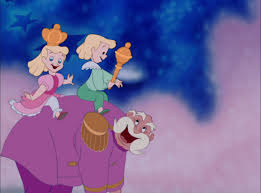
7. Inner and outer beauty are one. This is probably the least surprising. But it is really hammered home. Cinderella tries at nothing, practices nothing, and is perfectly good. She’s beautiful, so she knows how to waltz, sing, etc. Her sisters are ugly, so naturally they are terrible at all of it. 8. Her punishment made her the ideal princess. Soooo…. The prince notices her because of her, well her stupidity. All of the women in the village are in a single file line to meet the prince, and she is standing just outside that room and can’t find it. She’s actually stupid. But her big selling point is her humility, which the other women don’t have because they’ve been raised to be entitled. So somehow, her enslavement and abuse was actually a good thing because it made her the perfect mate. Messaging: women should be born rich (because that’s source of human value) but act like a servant. 9. She can stay out until MIDNIGHT?! This is crazy. Truly unthinkable. She goes to the ball, and she has until midnight. She dances with the prince and has a blast. They walk the grounds UNSUPERVISED! AFTER DARK! And then the prince goes to kiss her, when the clock strikes midnight. When she says she has to leave, the prince says: But it’s only midnight. ONLY MIDNIGHT?!
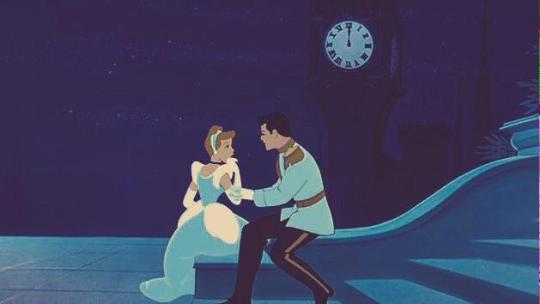
There was no electricity. Her house is on the other side of the village. It would be profoundly dangerous for an 17 year old girl to cross a village, alone, at that time of night. Also, it’s coming out in 1950. Perhaps I am wrong, but I do not believe that 17-year-old women being out with a man, at night, unaccompanied, until midnight was particularly smiled upon. And yet the movie acts like she has to leave super early. 10. Positive note(?): it does pass the Bechdel test, proving once again, that the Bechdel test is merely a low bar to show how poorly movies perform. It’s not meant to be the measure of all things feminism. A woman telling a woman, “Shut your mouth!” Or a woman hurling abuse at another while ripping her clothes to shreds. To quote the Bechdelcast: “Should it pass the Bechdel test if it’s just one woman telling another woman that she should kill herself?”
So yeah, watch Cinderella. You may be surprised, but overall, I think you’ll just be confused at how this because such a classic movie.
2 notes
·
View notes
Text
Superlike: first time short filming
vimeo
I enter into this post with trepidation because it requires me to admit or acknowledge that, not only to shortcomings exist, but I happen to have some, and they are being displayed publicly. But I believe in risks, and I believe in process, and I enjoy transparency, so why not acknowledge that I perceive the flaws that any viewer will also perceive? And in that acknowledgement, I actually get to experience some joy in learning and improving in something I love.
So lets get to it.
I write many a short film. Many a screen play. And they are many unproduced. Why? Probably because, despite lots of acting experience, and story telling experience, I lack the actual nuts and bolts knowledge of what it takes to produce a film. How does one get such experience? Just fekking doing it, I guess. So, some of my friends--who are coincidentally my roommates--decided to make some material. I wrote this short specifically for this project. And I learned a lot.
Some things work really well. Most of the individual frames work really well. My favorite moment is when Gabrielle crawls down to me, cutting from the door frame to the floor. Some other things don’t--like coming off of the floor. Also, the opening turn around when Gabby first comes in. The key issue in both of those moments is that, though I had a clear idea of what I wanted for the meat of those moments, I did not pay enough attention to how each moment would connect. During the filming, I had a feeling that something was off, but not until editing did the issue become abundantly apparent. BUT I DIDN’T KNOW WHAT I DIDN’T KNOW. Now, I know, and I’m excited to work on the next one.
1 note
·
View note
Text
Tom Ford, You Speak to my Heart
http://www.hollywoodreporter.com/features/tom-ford-designer-turned-director-925601 That's the link to the recent THR cover story on Tom Ford. It is fascinating. His rise in fashion, to his determined shift into film-making, to hints of his new movie, Nocturnal Animals, that sounds ABSOLUTELY AMAZING! All that got me through the article, but what really drew me in was Ford's reflections on his own mental health and thoughts of mortality. As someone who, for some reason, has always been aware of my mortality, a desire to experience it, and some times being crushed by the weight of it, Ford's words really spoke to me, and I felt him reflecting on issues that I thought only I had thought about in that way. "I can remember early thoughts of suicide at 8pr 9 years old." "Death is all I think about. There's not a day or really an hour that goes by that I don't think about death. I think you are born a certain way. I think you just come out that way." Those two quotes spoke to me very strongly. I've read a few articles on children and how certain factors can lead to existential depression--which in my experience never really goes away. I also like that he's not speaking from out side the Platonic Cave to the people looking at shadows. He's still struggling with the shadows. As a hustling (as opposed to struggling) actor, a lot of "established" people offer advice that feels like a Philosopher King advising a cave dweller. There's something inherently comforting when the "establishment" acknowledges that they too are just trying to get out of the cave, and that comfort comes in realizing that everyone feels that way. Tom Ford, I hope to meet you one day. In the meantime, I can't wait for Nocturnal Animals.
0 notes
Text
The Head and The Heart and Artist’s Right to Evolve

The album is OUT!!! I don’t know or care about anyone else--I’ve been soaking up every single the band has been periodically releasing over the last few months. All We Ever Knew, Library Magic--really amazing singles.
Some songs though, I don’t really care for, and then I go off on a mental rampage. A dialogue that sounds like this: “That’s not the Head and the Heart! That’s not the sound I listen to them for.” (yes, I end sentences with prepositions. My inner monologue is perpetually informal, but as I was saying...) “But it is the Head and the Heart! They made it!” “But I did not sanction this change.” And so on.
It’s a weird problem we always have. We as individuals change, but our expectations of others is that they’re static. Friends stay the same. Plastic surgery keeps actors looking the same. And bands continue to produce music in the style of their most successful songs. That is what they are. What they are to me, they are. I am the arbiter of identity in my universe.
But people do change. I’ve watched interview footage about how specifically The Head and The Heart members have changed since the last album. And I have to remember that I have tastes. I like certain aspects of the genre into which The Head and The Heart falls more than others. That’s why I love the songs I do love.
I’ve lost steam, I think. I don’t know quite where I thought I was going. But the album is really great! Check it out. Feel free to use the term Arbiter of Identity wherever you would like.
1 note
·
View note
Text
Kareem Abdul-Jabbar Weighs In
http://www.hollywoodreporter.com/news/nate-parkers-troubled-past-importance-926112
Some would probably say this is trivial, male-privileged, but this controversy is bound to distort both the negatives (making them more negative) and positives (what could have been) of Nate Parker’s Birth of a Nation. Abdul-Jabbar chooses to turn the criticism elsewhere: the romanticizing of historical figures to make a contemporary point.
“ And, according to records, Turner's rebels killed at least 10 men, 14 women and 31 infants and children. That's a harsh reality that should be acknowledged rather than buried because it says a lot about the effects of dehumanizing people until they are left with no other option but behaving inhumanely. Slavery, whether with chains and shackles or institutional racism that destroys hope for a better future, breeds violence.”
And
“...an attempt to romanticize Nat Turner, he overlooks what truly made him heroic and his rebellion a warning bell for the future.”
That being said he closes by saying:
“But these flaws don't make the film's strengths any less effective or admirable. Many of the scenes will continue to haunt me for years to come.”
I can’t help but wonder what how this film would be received without this controversy. More than just Nate Parker and Fox Searchlight will be wondering what could’ve been.
0 notes
Text
Another aspect of this Nate Parker Business
http://www.hollywoodreporter.com/news/birth-a-nation-blowup-casts-926113
First things first, finding this article or this subject matter of interest is not to claim its primacy over the allegations surrounding Nate Parker. That is an issue which will play out. It is interesting that the accused in this instance is not really “the accused,” because in most Hollywood instances, the case has been buried and never gone through the legal system. Nate Parker’s case was tried, and he was acquitted. That isn’t much comfort to many because male accountability in sexual assault cases has been basically non-existent, so an acquittal is not enough to convince many of innocence.
So it’s a good thing that’s not what this post is about...
This article is interesting because it shines a light on the movie process that many don’t really know about. My father is a lemon lawyer, and this side of the process feels a lot like selling cars. Is WME a sleazy car salesman consciously selling a salvaged car as new? Is Fox Searchlight to blame for not doing their due diligence? For not checking the “carfax?” Or does the oversight on all sides actually reflect how little these businessmen consider sexual crime to me something worth their time? Did they know and think it wasn’t a big enough deal?
Either way, there are clearly more implicated (if not legally, then ideologically/morally) in the darker sides of this film.
0 notes